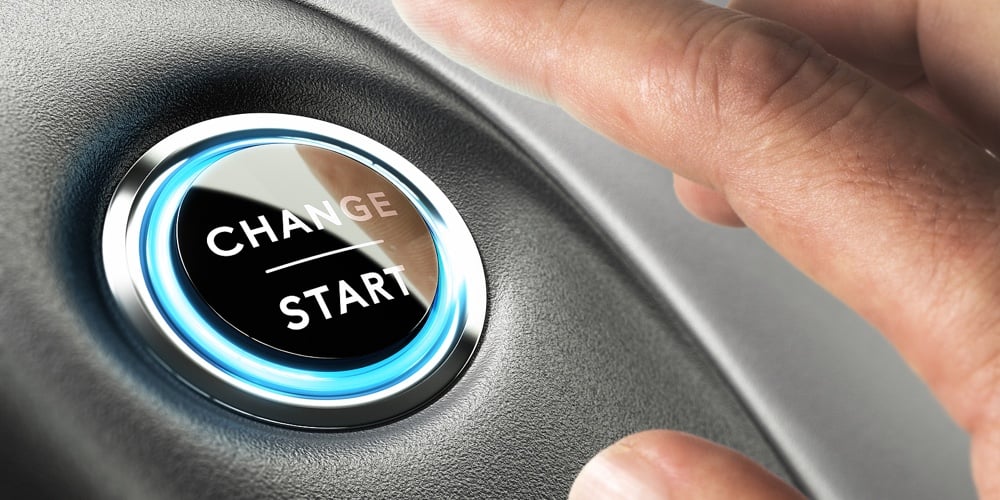Change has changed – Your guide to adapting

2016 feels like a long time ago, right? Towards the end of that year, I wrote about how, unlike the way our brains work, change doesn’t happen linearly. Sidestepping any math, this means people are unprepared for the realities of today, never mind tomorrow.
Sadly, few leaders (elected or otherwise) understand this concept. But you, my dear reader and honorary geek, can!
Linear change
We think in a line. A → B → C and so on. The Industrial Revolution led to mechanical advances which moved forward greatly during (and because of) the World Wars, and this spawned the modern technological age. Transistors launched a million possibilities, and we live in that digital era.
The small screen got bigger (and crisper)
Depending on your generation, you grew up with a B&W or color TV available in some fashion. Then came VCRs (or DVD players), along with cable/satellite boxes, and, by then, you might go for a snazzy HD TV. You’re living in the future! A future where you can finally make out the hockey puck!
A few more years passed and 3D was all the rage (and then it wasn’t), only to be replaced by 4K and HDR. For most of us, that’s where we are today (end of 2023). A lot of change, but not difficult to grasp. Screens got incrementally better, with some jumps larger than others.
Banking goes digital
During this same timeframe, banking has remained pretty similar. People can have a checking (share draft) and savings (share) account, along with special accounts like CDs, plus lending products. However, the act of interacting with these services couldn’t be more different.
First, there was online banking, which revolutionized accessing account details. In the early days, it was mainly a ledger that supported transfers. The web portal was akin to walking into a branch, only, paper and people-less, and open 24/7 (phone banking is a thing, but it’s a pain).
Then, we got what I consider the biggest banking innovation of the modern era: Mobile check deposit. This fundamentally changed how you interact with your banking institution, and eliminated the need for many to ever visit a branch. It also laid the “mindshare” groundwork for future P2P services.
Which brings us into the smartphone era with services like Zelle (bank-owned), Venmo (private company), Apple Cash, Cash App, etc. At this point, if you can’t do something on your phone (in the app or other simple path), and there’s no regulatory prohibition, why not?
These are massive changes, but they’re still pretty much linear. One thing led to the next. Many of us pushed credit unions for years to truly take on digital transformation strategies (that particular ship has sailed). Most are still woefully behind.
It’s time for a new approach. One that aligns with how the world is changing today.
Exponential (or logarithmic) change
Spoiler: Change has always been exponential, it’s just that the rate was slow enough that we perceived it as linear.
Transistors? While their number (used to) double every 18-24 months (Moore’s Law), the scales in which they existed were shrinking dramatically. There’s a bit of marketing-speak involved, but modern chips have components less than 10nm across (a silicon atom is 0.2nm)!
Climate change, biodiversity, sea level rise, and other environmental issues are also seeing an increased rate of change. In other words, extreme weather is getting both more extreme and more common. Rising seas of last century are now coming up faster. Species loss is increasing.
The challenge today is the rate of change … of change.
It’s not just tech
When we think of change, it’s easy to gravitate towards technology. Its forward march highlights the concept in tangible ways. Your really old phone was hanging on a wall. Your current one is a glass slab in your pocket that vastly outperforms the Apollo moon landers … and Mission Control.
It’s true, tech has revolutionized society and how we interact. At this point, you’re probably expecting me to dive into “AI” and chatbots. I could, but there’s so much already written, and frankly, I think what I already wrote about them explains their issues (and potential) just fine.
While technology lets us put our finger on specific change, it’s the more abstract stuff that creates real challenges.
The entire concept of “culture wars”, outlawing discussion of systemic racial inequities, and taking away women’s rights … each of these are symptoms of parts of society encountering exponential change and not knowing how to cope. Fear leads to poor choices (and groups taking advantage of that).
So … banking?
Your credit union isn’t immune to these changes. And it’s not just implementing more streamlined LOS platforms or mobile apps. A credit union is made of its members, and those are just people … people who are facing a rapidly (and more rapidly) changing world.
Credit unions have a future in embracing their past. Sure, you still gotta improve your tech stack (look forward rather than just at today’s expectations). But it’s about growing into the credit union you could be. Change will continue to occur; evolve your systems and processes, retain your culture.
Turns out, I went into this back in 2018. And dove deep into the concept in 2020 with a focus on credit union’s role in society. Thus, I inadvertently proved my point that lots may evolve but the core principles should remain true. Didn’t Edward Filene once say “keep purpose constant”?
The times they are a changin’
Change will continue at an increasing rate, and don’t feel bad if it seems overwhelming. It is. But stay focused on the things that matter: Fair treatment of all peoples (in rights and respect) and our shared planet, plus the prosperity of society (across a wide range of definitions).
Oh, and AI platforms will play a role in all of this (the 2023 word of the year is “hallucinate”, for when these systems confidently make stuff up). That role will definitely be to further mix up the status quo. I’m confident you will also find uses to improve member financial wellness!
And here you are, 1000 words in, better understanding and prepared for the changing change of the world (or just with your head spinning)! It’s pervasive across all areas, so keep an eye out for it, as well as for people who are using the uncertainty this change brings to advance their own agendas.
Embrace openness and curiosity over fear. Credit unions were built to make the world a better place, one member at a time. Let’s do all we can to ensure change always leans towards kindness and prosperity for all.





